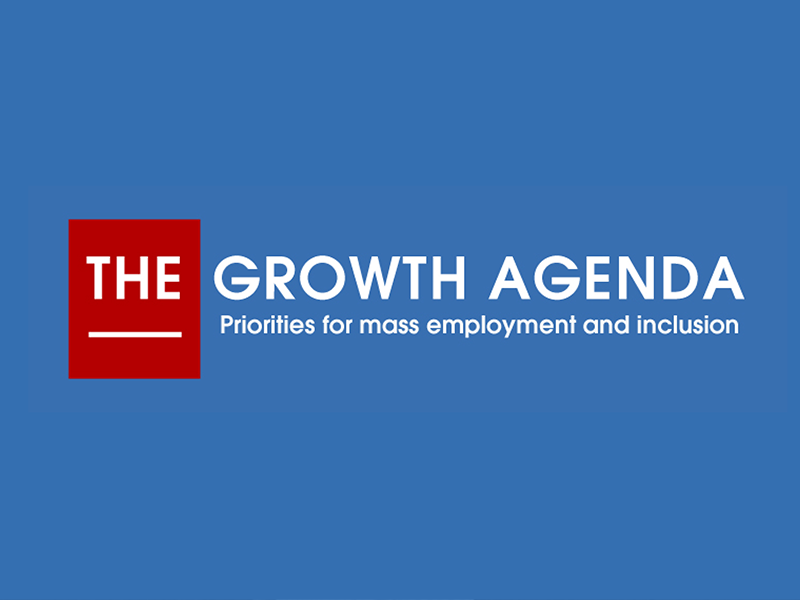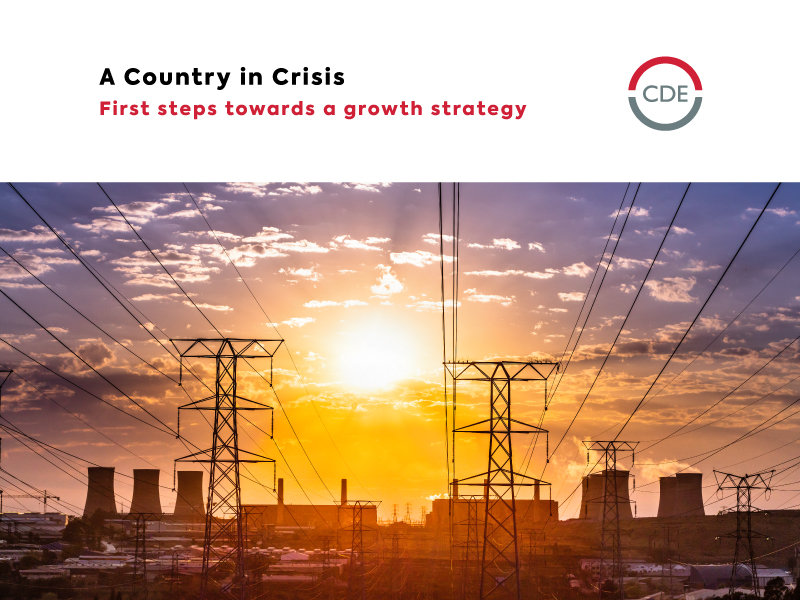
Resolving poverty, inequality and unemployment impossible without major changes in economic policy
Johannesburg 6 April 2016 – The Centre for Development and Enterprise (CDE), today called for major policy reforms to rid the country of poverty, unemployment and excessive inequality, at the launch of its Growth Agenda series of policy reports.
Speaking at Constitutional Hill to leaders in business, government, civil society and the media, Ann Bernstein CDE’s executive director said “South Africa is in deep trouble. Continuing with our current policy framework will not result in the millions of jobs and much higher growth that we need. It is time to challenge the conventional wisdom about growth, poverty and employment. If we don’t reform – with purpose and speed – much that has been achieved since democracy could unravel.”
She said CDE’s suggestions for economic reform will play to SA’s strengths and ensure that the country is able to harness its world class business community and rapidly growing cities to deliver the growth and mass employment the country desperately needs. “We need to rethink the approach to development, focus on our strengths and follow a much more market-friendly approach.”
Laurie Dippenaar, chairman of the CDE Board, said: “The CDE Growth Agenda delivers a strong and compelling argument for what South Africa must do to fulfil its potential. You cannot achieve high growth if government is anti-business and yet simultaneously crony capitalist. Rhetoric must be matched by action.
“South Africa cannot change the global economy but we can make new policy choices for our country. The priority actions CDE recommends would help create an environment in which investors and entrepreneurs are willing to risk capital and help build a job-rich dynamic economy.”
“Under the status quo”, said Bernstein, “SA essentially administers and ameliorates poverty. Genuine inclusion is about moving beyond opportunities for the highly skilled and the politically connected. Too many South Africans are poor, with poverty managed through social grants and subsidies for over a third of the population who remain excluded. This is totally inadequate. It’s time we took action to steadily eliminate SA’s extraordinary high poverty rates through genuinely inclusive growth, based on mass employment.”
Compiled over two years by academic and policy experts, CDE’s Growth Agenda draws on international and South African evidence to focus on five priority areas for policy reform: jobs, accelerating inclusive growth, skills, cities, and the business –government relationship.
The series of reports spell out, with specific practical recommendations, the priority areas in which reforms are required in order to achieve higher and more inclusive growth. Below is a brief summary of the key areas in which reform must occur.
- Government must place growth and jobs at the top of its policy agenda.Growth and employment must become the criteria by which the consequences, intended and unintended of all other policy initiatives should be assessed and repealed if necessary.
- Transformation and growth must work together for all South Africans to benefit and not just an elite.Rebalancing the current approach to transformation away from elite enrichment to growth-driven inclusion and empowerment, so that it supports rather than undermines growth prospects is one of SA’s most urgent priorities.
- The country needs one credible new strategy for faster and more inclusive growth replacing the three contrasting and competing ones we have at present. From energy, infrastructure delivery, to housing, transport, schooling and healthcare, appropriately regulated but liberalized markets can deliver cost effectively and very widely. Competition is good for growth – it should apply across the entire economy including the crisis-ridden SOE sector.
- South Africa needs jobs for the workforce that we havenot the workforce we wish we had. The consequence of the mismatch between policy-makers’ vision of a high-skill, high-wage growth path and the reality of an under-educated workforce is unemployment on an epic scale. By driving up the costs and regulatory risks associated with employing people, the implementation of the decent work agenda has priced unskilled workers out of the labour market. In the eyes of our policy-makers, work that is not ‘decent’ is worse than no work. The implication is that no wage is better than a low wage. The South African economy must fire on all cylinders. And this must include creating more space for labour-intensive industries that use lots of unskilled workers to grow.
- Growth requires a reset of the state-business relationship
o The country will not succeed if government is pro-growth but anti-business and simultaneously crony capitalist
o Market friendly regulatory certainty is essential for big and small business
o Business must also get its own house in order - Skills are vital at every point in the growth agenda.If SA does not improve the quality of technical and vocational training, we risk repeating the mistakes of basic education – expanded access but very poor quality output. The skills pipeline has to be reformed from beginning to end and until this bears significant results we need to recruit foreign skills in much greater numbers.
- South Africa’s future is urban.Policies, power and resources must now catch up with this reality. SA needs to end its ambivalence about urbanisation. Large cities must be at the heart of a new growth strategy. Cities need a stronger voice in national policy making and additional powers along with greater accountability to residents. SA needs new housing and transport policies that support growth and employment.
Media: For further enquiries or to attend the event at 16h00 today at the women’s gaol at Constitution Hill please contact:
Centre for Development and Enterprise
Buhle Hlatshwayo
media@cde.org.za
(011) 482 5140 or 078 340-2772 Brunswick
Timothy Schultz
(011) 502 7409 or 0793092496
NOTES TO EDITORS
CDE’s The GROWTH AGENDA series consists of seven reports:
1. Summary Overview: Insights and key recommendations
2. Jobs
3. Accelerating inclusive growth
4. Cities
5. Skills
6. Business and Government
7. An Export Processing Zone (EPZ) for Nelson Mandela Bay Metro
ABOUT THE CENTRE FOR DEVELOPMENT AND ENTERPRISE
The CDE is an independent policy research and advocacy organisation. It is one of South Africa’s leading development think tanks, focusing on critical development issues and their relationship to economic growth and democratic consolidation. Through examining South African realities and international experience, CDE formulates practical policy proposals outlining ways in which South Africa can tackle major social and economic challenge.



